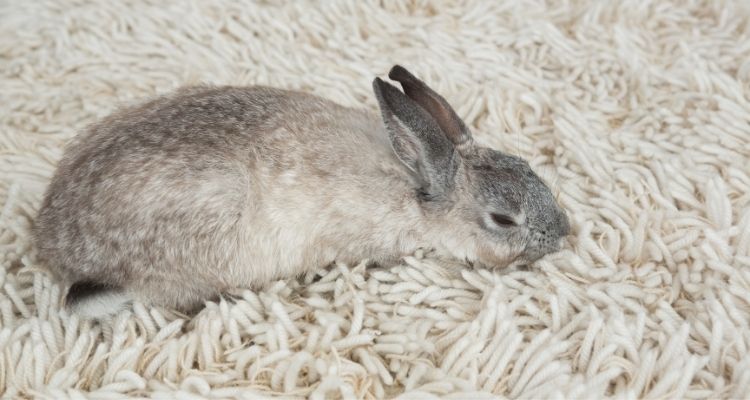A healthy pet rabbit is continually eating. A bunny that unexpectedly stops eating is a cause for concern, particularly if it lasts for a few hours or more. GI stasis in rabbits is the most common reason a rabbit will stop eating. If this happens to your rabbit, you need to act quickly.
What is GI Status in Rabbits?
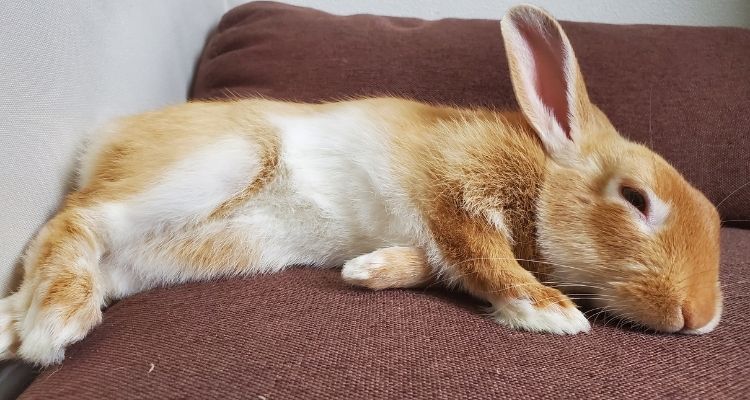
GI stasis, otherwise known as gut stasis, ileus or gastrointestinal stasis is a potentially life-threatening condition impacting rabbits. It occurs when the normal, regular, wave-like movements of the intestines either slow down or stop altogether.
Bad bacteria can then build up within the gastrointestinal tract causing bloating. This makes the bunny more hesitant to drink and eat which, in turn, causes their condition to worsen.
Affected bunnies quickly become dehydrated and deprived of essential vitamins and minerals. As the condition progresses, food or fecal material within the gut starts to dry out becoming hard and very challenging to successfully pass. This can lead to rabbit constipation and an obstruction.
GI Statis incredibly harmful for rabbits and can result in death if left without treatment.
The gastrointestinal tract of rabbits is very sensitive and responds acutely to any disease process within the body.
How Do Rabbits Get GI Stasis?
The reason for the gut stasis may be from a different part of the body, or may be to do with their diet and environment. Typical reasons for GI stasis in rabbits include:
- Lack of drinking water
- Lack of exercise
- Movability issues caused by being overweight
- Joint pain in rabbits
- Long term use of antibiotics or using unsafe antibiotics for rabbits
- Low fiber, high carbohydrate and high fat diets
Symptoms of GI Stasis in Rabbits
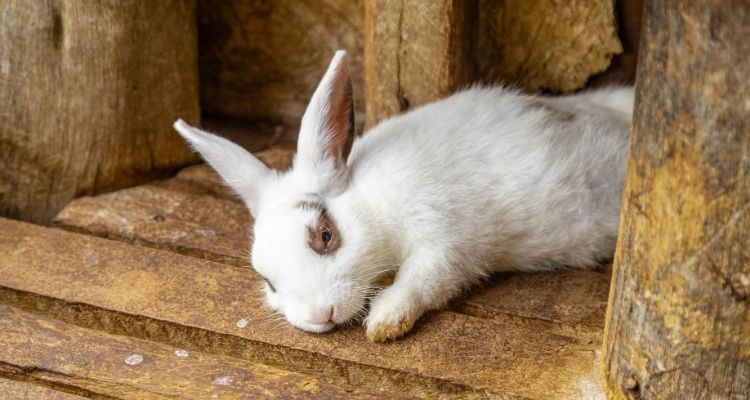
With GI stasis, the regular, quiet gurgling of the healthy rabbit intestine may be replaced either by very noisy, intense gurgles or silence. The noise is gas in the intestines shifting, which can be very painful for your bunny. Silence is worse, as nothing is moving.
The bunny may become lethargic, have no appetite and may hunch in a ball, loudly crunching his teeth in pain.
Symptoms of GI stasis include very little (or no) fecal pellets, or fecal matter that clings to the bunny’s bottom. In many cases, very small fecal pellets will be wrapped in clear or yellowish mucus.
This potentially serious condition is called Enteritis. This is an inflammation of the intestinal lining and should be treated as an emergency.
If your rabbit ceases eating or pooping for 12 hours or more, the condition is an emergency. In fact, refraining from eating for a few hours is significantly dangerous, so don’t hesitate to seek veterinary help if you notice any change in your bunny’s eating habits.
Treating GI Stasis in Rabbits at Home
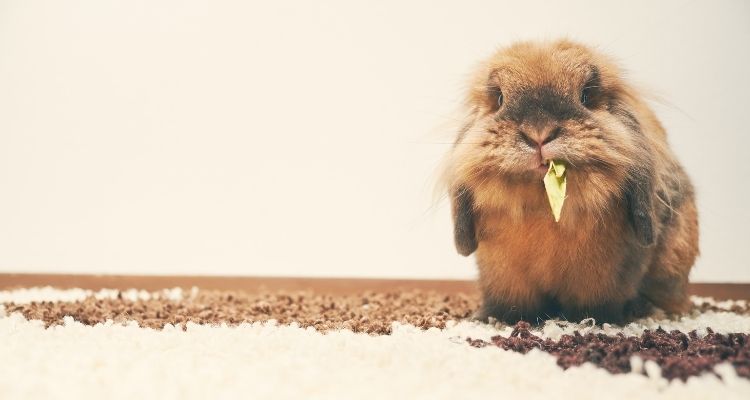
In the absence of apparent signs of GI stasis in rabbits, consider first any environmental changes you may have made that might cause stress in your rabbit. Fix these by reversing whatever you changed; then see if your rabbit will eat a treat or some food.
You can attempt home remedies in the first couple of hours after you recognize that your rabbit stopped eating. Rabbits that don’t eat for even just a day are in a life-threatening situation and require immediate veterinary attention.
Don’t delay and, even while you’re trying home remedies, give your vet a call for a phone consultation.
Start with some mixed-vegetable baby food and a syringe. Force-feed your rabbit to stimulate its gastrointestinal tract. If your rabbit goes too long without eating, its intestines will fill with gas. This gas is very painful and the scariest part of GI stasis in rabbits.
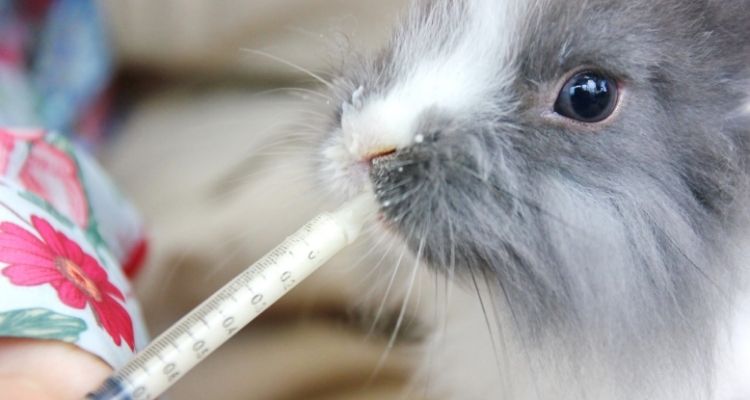
After force-feeding, encourage your rabbit to exercise and massage its belly to encourage the movement of the gastrointestinal tract.
Increase the amount of water your rabbit consumes to provide extra hydration. Fill both a clean water bowl and a water bottle for your rabbit to drink from. Use a syringe to give your bunny water if it will not drink on its own. You can also use an unflavored electrolyte mixture.
If your rabbit is still eating a small amount, offer greens with higher water content, such as zucchini and celery, as well as lots of hay. Avoid feeding your pet rabbit pellets at this time.
Early Signs of GI Stasis in Rabbits
Keep a close eye on your rabbit at all times. If you notice that food is being left in the bowl or hay left in the rack when it is usually all eaten by your rabbit, that may suggest a change in appetite.
It’s worth remembering, though, that this isn’t the only way to keep an eye on your rabbit’s appetite, and standing by until you notice food being left may be too late.
The best way to keep an eye on your rabbit’s appetite is by watching their poo! Rabbits poo around 300 times a day, and it’s important that you get to grips with your rabbit’s pooing routine.
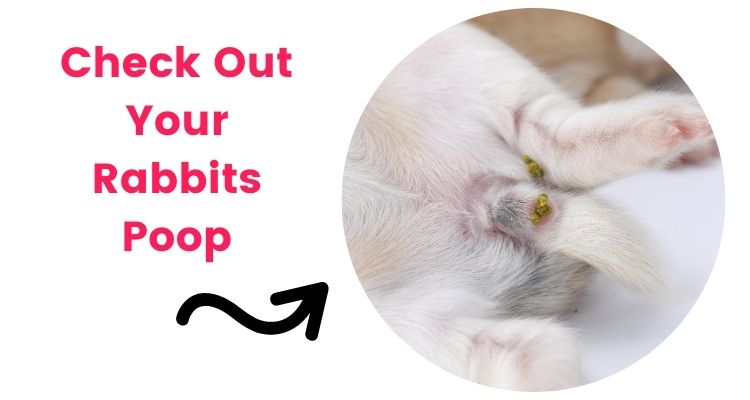
A decrease in poos or a change in consistency of the faeces is the first sign of something being amiss.
Fecal pellets that are smaller sized and firmer than usual are undoubtedly an indicator that your rabbit isn’t getting sufficient food through their gut.
Did you know that rabbits eat their own poo to have a second go at digesting the grass? Large, wet feces may suggest that your rabbit isn’t eating his feces correctly, which is often an early sign of something wrong.
The initial signs can be quite subtle with your pet maybe sitting quietly, being hunched up or agreeing to be handled when they are usually quite feisty. In contrast, if your rabbit has discomfort in their belly they may resent being picked up, grunt or grind their teeth.
Occasionally you may recognize your pet having a larger abdomen than usual, this suggests swelling of the stomach organs.
Affected bunnies often stop eating and drinking. They may also pass stools which vary from being small, to loose and malformed and in extreme cases no stools at all. Urine output can be variable depending upon the degree of dehydration your pet is dealing with, but it’s generally either normal or reduced.
If your pet shows any of these signs it is an emergency and you must contact your veterinary surgeon immediately.
How Long Can Bunnies Go Without Food?
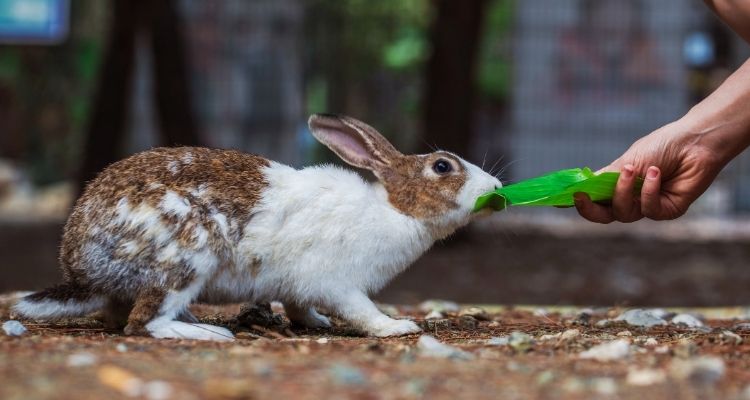
Unfortunately, rabbits that stop eating quickly start to go downhill. The digestive system of a rabbit relies on constant ingestion of small amounts of food, and when bunnies cease eating this very quickly shuts down.
If your rabbit is more quiet than normal, is sitting still and hunched up, does not desire to move about, or has not munched for greater than 12 hours, contact your vet immediately.
Teeth grinding, severe diarrhea, or reverse no poos at all, difficulties in breathing, straining to urinate or poop all need urgent veterinary care.
The gut stops turning over efficiently and they may begin to bloat. This is particularly painful and compounds the problem, as the pain causes the rabbit to eat even less.
It rapidly ends up being a vicious cycle, so stepping in early and getting appropriate veterinary help is important.
How to Avoid GI Stasis in Rabbits
Ensure your rabbit is receiving a top quality, hay based diet to provide them with the fiber they need for a healthy digestive system. This also encourages the proper wear of their teeth, thus preventing unpleasant spurs and overgrowths.
Provide an enriched, stress free environment. Rabbits are sociable creatures and like companionship, however the sudden introduction or loss of a partner can result in them considerable stress and upset.
It is important that your bunny has sufficient space to run around without feeling threatened by their environment.
Other Causes for Rabbits to Stop Eating
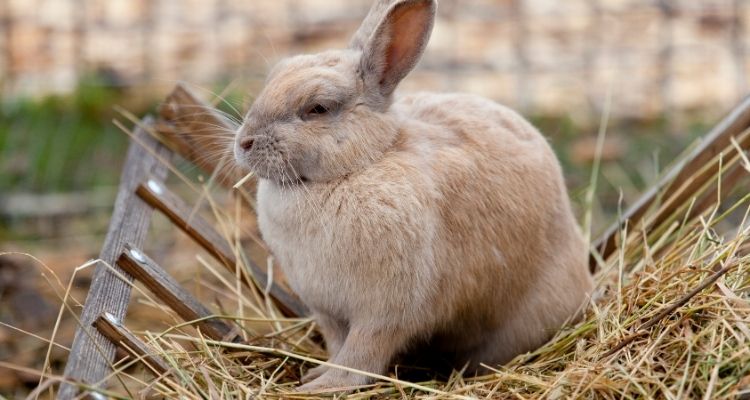
Dental Diseases
This is another extremely common reason for rabbits to stop eating. Rabbits’ teeth grow continuously, which is a wonderful adaptation to the abrasiveness of their main diet – grass.
However, rabbits consuming the wrong kinds of food, nibbling the wrong way, or who were born with problems, can get overgrowing teeth.
This causes pain in the jaw and ulcers on the tongue or the cheek which hurt every time the rabbit chews; it is not surprising to see that they might stop eating!
It’s important to get your rabbit’s teeth checked by your vet often to ensure that any problems are caught and corrected before too much damage is done.
Dietary Changes in Rabbits
Rabbits don’t cope well with sudden changes to their diet and it can cause them to stop eating. Any changes in a rabbit’s diet should happen gradually.
Poisonous plants like any plants that grow from bulbs, potato tops and oak leaves can cause serious illness.
Rabbit Stress
Changes in housing and stressful circumstances can stop a rabbit eating. Once they stop eating, their gut slows down and it may be hard to get it going again without veterinary care.
Stomach Ulcers in Rabbits
Stomach ulcers are painful areas that form in the lining of the stomach, this is a common challenge in rabbits. Stomach ulcers are often caused by stress.
Rabbit Diseases
Diseases such as pasteurellosis (a bacteria) and myxomatosis (a virus preventable by vaccination) could make your rabbit feel unwell and stop eating.
Treating GI Stasis in Rabbits
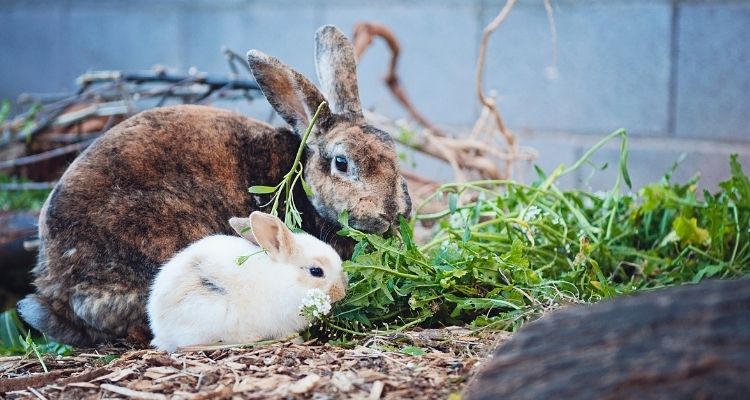
If you suspect that your bunny is experiencing GI stasis, you must take him/her to your rabbit-experienced veterinarian without delay. Tell the vet your suspicions. They will probably listen for normal intestinal sounds and palpate the bunny’s abdomen.
The vet also may wish to take x-rays to see whether the various parts of the digestive tract contain normal ingested matter, feces or foreign objects; or if they are empty or gassy.
The appearance of the digestive tract will help the vet determine whether there is an obstruction and, if so, where it is located.
GI stasis is not an illness in and of itself. It is a symptom of an underlying disorder that has caused the bunny enough stress or pain to cause the GI tract to slow down or stop. Gastrointestinal stasis may be your first clue that something else is wrong that needs proper diagnosis and treatment.
Illnesses develop quickly with rabbits. Often they do not look ill until they are really unwell. This is to avoid attracting attention from predators. If you think that your pet is unwell, contact the vet immediately.

